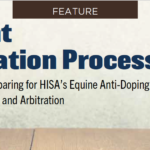Written by Peter J. Sacopulos, JS. Originally posted on: The Trainer Magazine, Breeders’ Cup 21 to Pegasus World Cup 22 – Issue 62, October 21, 2021
Recent lawsuits are shining a light on one of Thoroughbred racing’s ongoing problems: owners who do not pay their bills. Trainers often top of the list of those who get stiffed. What can you do to protect your business and help ensure you are paid for your services? And what are your options when a client does not pay?
A trainer’s dream
Growing up on a farm in Indiana, Frank seemed to have been born with a knack for horses. By his mid-twenties, he had begun training Thoroughbreads and was looking for clients he could build a business on. Walter, an investment banker from Indianapolis who loves racing, purchases a promising Thoroughbred named Rocketastic and needed a trainer. Walter heard good things about Frank, and after watching “the kid” work with a horse on the track, a deal was struck.
Frank agreed to train Rocketastic for $100 a day, or $3000 a month. This amount included the cost of feeding and stabling the horse in Frank’s small barn. The men shook hands, and Frank trailered the horse home. Rocketastic chalked up impressive fractions and earned his gate card. Official works were logged and approved. The owner and trainer agreed that three or four starts during the two-year-old season seemed reasonable. Walter mailed Frank a check at the end of every month to pay for training and expenses during the pervious 30 days.
Rocketastic had the makings of a real contender. But early in the season, the horse suffered disappointing starts. Adding to Frank and Walter’s frustrations, the local racing secretary repeatedly wrote races that kept Rocketastic off the track on race day.
The money stops
Frank was confident it would all work out. But by late August, he had not received payment for his work in July. Frank felt certain this was an oversight on Walter’s part. After all, he had Walter share a good working relationship and common goal. Frank understood that Rocketastic was not earning his keep, but Walter appeared to have plenty of money to cover costs. The owner was well dressed, sported a Rolex watch and drove a Porsche. He lived in a beautiful home in a gated community, and his children attended expensive private schools.
When Frank called Walter about the lack of payment, the owner assured him that a check was already on the way. Frank continued to train Rocketastic, but by mid-September, neither the July nor the August payments had arrived. Frank again called Walter, who insisted there must be a problem with the mail. Frank grew skeptical after his local postmaster told him there had been no complaints of lost or stolen mail. Soon Frank’s calls to his client were unanswered and unreturned. Voicemails, emails and texts were ignored as well.
Still, Frank was reluctant to give up on a promising horse, or the promises of its owner. By early November, Walter owned him over $13,000 in back pay and expenses. The lack of cashflow put tremendous stress on Franks’ business and his marriage. He did not know what to do or where to turn.
A reoccurring problem
The situation that I described as hypothetical, but it is based on numerous real-life complaints that I have heard from clients and potential clients. The fact that some owners do not pay their bills is a serious industry issue. It is known all too well by many who work in the industry. Anyone who thinks this is simply the result of trainers who lack business sense working with owners who lack horse sense should think again. Recently, the racing press has been filled with articles covering cases currently winding their way through the courts. Details vary, but the bottom line is the same: Trainers are not getting paid for their work.
In this article, I will review high-profile cases and offer some pointers to help you avoid payment problems. I will also explore the options available when a client is unwilling to pay.






